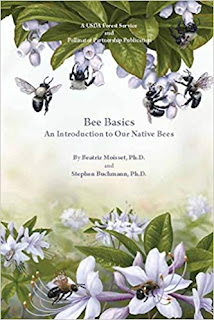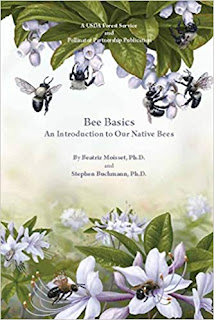
The USDA Forest Service and the
Pollinator Partnership have teamed up to produce an excellent 40-page full
color publication entitled Bee Basics: An Introduction to Our Native Bees.
It is authored by Beatriz Moisset, Ph.D. and Stephen Buchmann, Ph.D. with Illustrations
by Steve Buchanan. This publication shares a close up look at this treasure of
native bees. They provide an invaluable ecosystem service, pollination, to 80
percent of flowering plants. Bees pollinate approximately 75 percent of the
fruits, nuts, and vegetables grown in this country.
Native bees are a hidden treasure,
they can be found anywhere in North America, where flowers bloom. Native
pollinators have been pollinating the continent’s flowering plants since long
before the arrival of honey bees. Even in today’s altered landscapes, native
pollinators continue to do the yeomen’s share of pollination, especially when
it comes to native plants. The world as we know it would not exist if there
were no bees to pollinate the earth’s 250,000 flowering plants.
Some native bees and other
pollinators are experiencing population declines and range reductions. Many of the same factors affecting honey bee
health are also affecting native bee species health as well. A number of
government agencies, nongovernmental organizations, and private individuals are
creating pollinator gardens throughout the country that will benefit native bees
and other pollinators. Helping native bees is essential to our continued
survival, health, and well-being. These
animals benefit us all because of the invaluable ecosystem services they
provide to the environment and to our farms, forests, and gardens.
Get involved, observe bees with
close focusing binoculars; plant a small pollinator garden; or help a neighbor,
student, or family member drill small holes in scrap lumber to create a bee house.
Do your share to make sure this precious legacy continues. Click here to read the full
publication.
